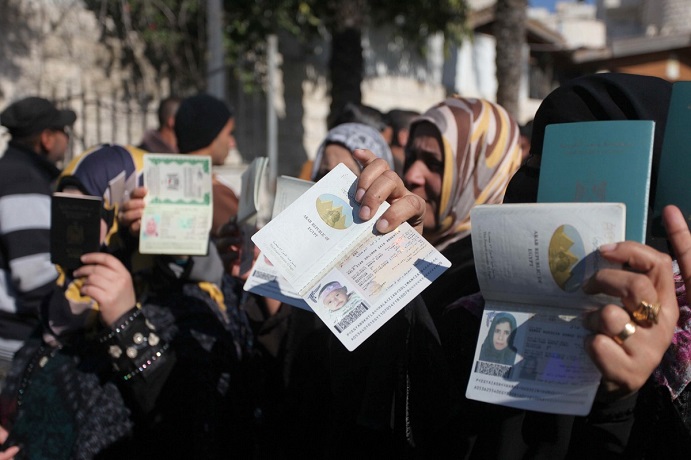
Yousef Alhelou
Middle East Monitor / March 10, 2020
Colonial powers subjugated other nations and imposed their own language and culture upon the indigenous people. Ever since Israel was established at the expense of the inhabitants of Palestine and uprooted three-quarters of a million of them in 1948, successive Israeli governments have changed the Arabic names of cities, towns, roads and other places across the occupied land and imposed Hebrew versions. Not content with driving out the people and simply changing the names, the Israelis have, quite literally, wiped more than 500 Palestinian towns and villages off the map in an ongoing act of wilful destruction that has been called, rightly, “ethnic cleansing”.
In 2009, the then Israeli Transport Minister Israel Katz ordered that signs on all major roads in Israel as well as occupied East Jerusalem and the West Bank should be changed, with English and Arabic place names becoming straight Hebrew transliterations. It was a systematic policy to suppress the Arab-Palestinian presence and identity and to Judaise the land between the River Jordan and the Mediterranean Sea. It ignored the fact that 20 per cent of Israeli citizens are Arab-Palestinians. Confronting the Palestinian, Arab and largely Islamic identity of Palestine continues to this day, including culture, language and even the appropriation of food.
Nevertheless, the Palestinians are starting to hit back and are preserving the place names in the collective memory in very imaginative ways. Refugees who were forced to flee their homes and towns during the Nakba “catastrophe” of 1948 and the Naksa “setback” of 1967, and their descendants, are keeping alive the memory of where their families once lived by passing on their oral history to the younger generations. This along with the land registry documents and household keys are the evidence of their roots in the land of Palestine.
Moreover, many Palestinian families are returning to the tradition of naming their children after the cities, towns and villages that their parents and grandparents were forced to leave. In doing so they are expressing their love, devotion and attachment to the land, as well as their wish to exercise their legitimate right to return in person one day.
Thus we see many girls being called Yafa, Bisan, Jeneen, Dalia, Haifa, Banyas, Safad, Osdood, Eilat, and Falasteen — the Arabic name for Palestine — with Yafa, the coastal city of Jaffa, being the most popular. Both boys and girls have been called Jaleel, Elia’a and Karmel, to name but a few examples. The holders of such names may never have been to these places due to Israeli travel restrictions and ban on free movement imposed on the Palestinians of Gaza, the West Bank, Jerusalem and the Diaspora.
The Palestinian Ambassador in London, Dr Husam Zomlot, named his son Jaleel after Al-Jaleel region in northern Palestine. “This place is very dear to me,” he explained. “When Jaleel grows up I will take him along with his brother Saeed and his sister Alma to visit their uncle’s house in the place where I spent part of my childhood. They will be proud and know that Al-Jaleel is part of their homeland, just like Jerusalem, Rafah, the Jordan valley and other places are.”
It’s an ongoing battle to maintain the collective memory of the Palestinian people. Carrying the names of cities and towns in historic Palestine is one aspect of the wider Palestine-Israel conflict, and is reflected in family names as well as first names. Surnames such as Al-Nabulsi relate to those who came from Nablus, for example; those called Al-Safadi are from Safad, while Al-Karmi relates to one-time residents of Tulkarem. Others include Al-Majdalawi from Majdal, Al-Asqalani from Asqalan (Ashkelon), Al-Sdoodi from Asdood (Ashdod).
According to Palestinian-British academic Ghada Karmi, this phenomenon is on the rise and a way for the people to reclaim their country. “Using names of cities is a reflection of the desire to return to those cities,” she pointed out. “It’s one of the ways in which Palestinians assert their national rights to be able to live there freely. It symbolises the love and longing for the place where families originated from.”
Yafa Abu Akr is from Gaza, and says that she is proud of her name and dreams to visit “her” city. “My father gave me this beautiful name because he hails from that region. People ask me about the name and it makes me happy because it’s unique. My grandmother who was born in Yafa told me about its magical beauty and how people were living a happy life planting their fields. I only know it through pictures. I wish to visit it one day.”
When did such names come back into popular use? Palestinian academics, intellectuals and activists believe that the trend grew rapidly following the outbreak of the first Intifada in late 1987. The popular uprising led to the revival of Palestinian consciousness and historical awareness as patriotism and opposition to the Israeli occupation increased. With Israel’s colonial-settlements taking more and more of historic Palestinian land, we can expect to see even more children named after Palestinian cities, towns and villages as an open challenge to the occupation.
Yousef Alhelou is a Palestinian journalist based in London





![vrijdag 17 mei in Amsterdam: in gesprek [videoverbinding] met Palestijnse arts Ghassan Abu-Sittah](https://palestina-komitee.nl/wp-content/uploads/2024/04/abu-Sittha-1-1-218x150.png)






